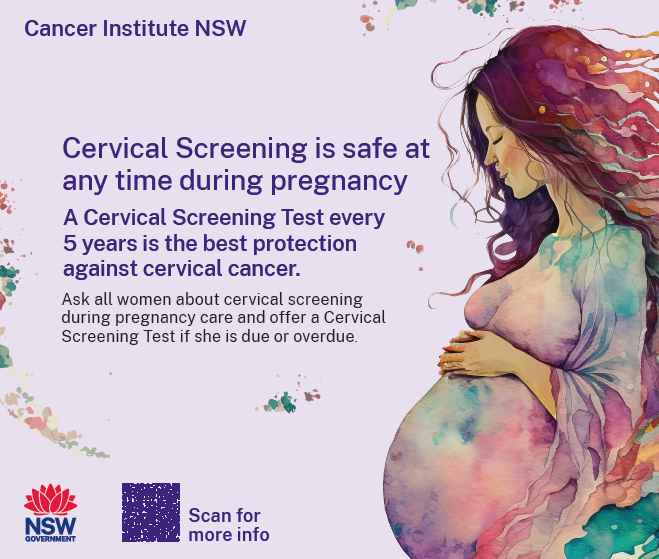Cervical screening during pregnancy
Jump to:
Cervical screening during pregnancy
It is safe to have a Cervical Screening Test as part of your routine pregnancy care.
Routine antenatal and postnatal care should include a review of a woman’s cervical screening history, and a Cervical Screening Test if this is due or overdue.
All women and people with a cervix have two choices for cervical screening, self-collection or clinician-collection, including during pregnancy.
As a midwife or doctor working with women, you have an opportunity to promote the importance and safety of cervical screening, and support women to choose to have the test done of they are due.
Why cervical screening during pregnancy is important
For some women, pregnancy will be the first or only time they are connecting with health services and have ever been asked about or offered cervical screening. This provides a unique opportunity to reach under-screened and never-screened people who may not otherwise attend health services and will miss out on the potentially life-saving test.
Most cervical cancers occur in people who have never been screened or do not screen regularly. Having regular Cervical Screening Tests is the best way to protect against cervical cancer.
Pregnant women can safely have cervical screening at any time during their pregnancy as part of their routine care. The recommended sampling equipment to be used during pregnancy is the cyto-broom soft brush for clinician collected cervical samples. The Endocervical brush is NOT recommended for use during pregnancy.1
Tips for healthcare providers:
Ask all pregnant women and people with a cervix about their cervical screening history and when they are next due as soon as possible in pregnancy care.
- Promote the importance of cervical screening in preventing cervical cancer and reassure them of the safety of the test during pregnancy.
- Preform a Cervical Screening Test at any time during pregnancy, including either the self-collection or clinician collection option. Or refer to another health care provider who can do the test.
Accessing the National Cancer Screening Register
Healthcare providers can contact the National Cancer Screening Register (NCSR) to check a participant’s Cervical Screening Test history or results by calling 1800 627 701, online via the Healthcare Provider Portal, or through integrated clinical software (ncsr.gov.au).
Resources
To support the NSW maternity healthcare workforce to encourage and support women to choose to have a Cervical Screening Test when they are due during pregnancy, resources have been developed with key stakeholders. We encourage you to use these resources in your health service.
Contact the NSW Cervical Screening Program at CINSW-CervicalScreening@health.nsw.gov.au to order free resources and for more information about cervical screening during pregnancy.
Information for pregnant people

Posters

- Posters with QR code (A3 size). To order free posters email: CINSW-CervicalScreening@health.nsw.gov.au
- Digital Poster for screens (PowerPoint)
Mousepads

- Mouse Pads for clinic rooms, encouraging conversations with patients. To order free mouse pads email: CINSW-CervicalScreening@health.nsw.gov.au
Videos

- Cervical screening during pregnancy (2:25sec)
- Make Time for a Cervical Screening Test (30sec)
- Safety of cervical screening during pregnancy (30sec)
- Yarning about Aboriginal Women’s Health Business - South Eastern Sydney LHD
Cervical Screening Information

Cervical Screening Training

- Cervical Screening Comprehensive Skills Training, Family Planning Australia
- National Cervical Screening Program Online Training Modules
- National Cervical Screening Program Online Education modules, Australian Centre for Cervical Cancer Prevention
- Cervical Screening, HPV and Self-Collection, Australian Centre for Cervical Cancer Elimination
1. Cancer Council Australia, 2025. 7.1 Pregnancy, National Cervical Screening Program Guidelines. Available at: https://app.magicapp.org/#/guideline/Eez2Kj


